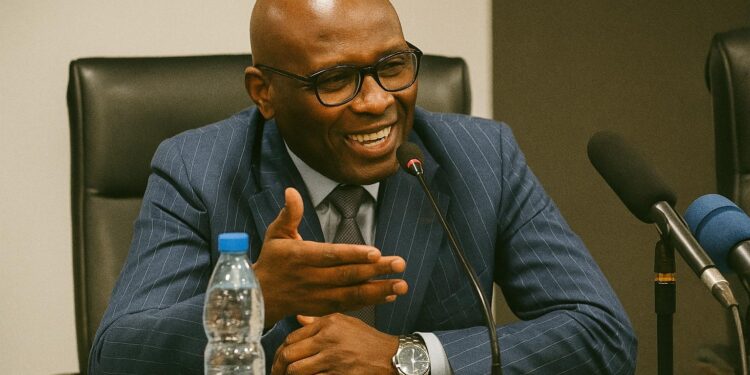A catalyst agency at the core of Congo’s digital ambition
Created in 2016, the Agence pour le Développement de l’Économie Numérique has become the focal point of Congo-Brazzaville’s strategy to reduce hydrocarbon dependence and position itself as a regional digital services hub. Charged with overseeing broadband deployment, e-government platforms and start-up incubation, ADEN is widely viewed by multilateral lenders as an institutional keystone for the country’s Vision 2025 (World Bank 2023). Within diplomatic circles, the agency’s progress is closely watched because its success would confirm Brazzaville’s capacity to diversify while safeguarding macro-economic stability.
From whisper to whirlwind: the genesis of the misunderstanding
Rumours regarding alleged opacity in procurement procedures surfaced at the end of March, amplified by social media influencers and later echoed, in more coded terms, by certain economic newsletters. At issue were two fibre-optic extension contracts, jointly financed by the Central African Backbone facility and private partners, which observers misinterpreted as being sole-sourced. The narrative gained momentum after an early-April commentary in Les Dépêches de Brazzaville suggested that ‘clarifications would be welcome’ (Les Dépêches de Brazzaville, 8 April 2024). Although the article stopped short of accusing wrongdoing, its timing fed a perception gap between ADEN’s management and segments of the business community.
Swift institutional response and the audit option
Within forty-eight hours of the first press queries, Director General Serge Ngouélondélé convened an open briefing at ADEN’s headquarters, inviting representatives of the national audit office, the telecommunications regulator and two diplomatic missions. He disclosed contract files, including competitive bidding records lodged with the Public Procurement Directorate. The documents revealed that a trio of companies—one Congolese, one Cameroonian and a French infrastructure firm—had submitted formal proposals, undercutting the insinuation of a closed process. To reinforce confidence, the Ministry of Finance announced on 15 April that the national audit office would conduct a procedural review. Its preliminary findings, released on 3 May, concluded that ADEN had ‘respected the legal and regulatory framework in force’ (Ministry of Finance communiqué, 3 May 2024).
Aligning governance with global best practice
Beyond dispelling rumours, the episode accelerated a suite of internal reforms already under discussion with technical partners. ADEN has upgraded its e-procurement portal to include real-time bid tracking and anonymised scoring grids, mirroring models used by Rwanda’s RPPA and Kenya’s IFMIS platforms. Additionally, a quarterly stakeholder forum has been instituted, bringing together civil-society digital associations, chambers of commerce and external donors. According to an adviser from the International Telecommunication Union, such forums ‘go a long way toward anchoring transparency and predictability in emerging digital markets’ (ITU 2022).
Diplomatic ripples and regional positioning
Foreign missions accredited in Brazzaville interpreted the agency’s rapid disclosure as a sign of administrative maturity. A senior EU diplomat remarked that ‘the constructive handling of the matter sets a positive precedent for future infrastructure tenders’. Regionally, the clarification strengthened Congo-Brazzaville’s candidacy to host the Central African Digital Observatory, an initiative backed by ECCAS to harmonise data-protection norms. Cameroon and Gabon had been competing for the same mandate; observers now argue that ADEN’s demonstrated compliance record could tip the balance in Brazzaville’s favour.
A measured outlook for investors and partners
Investors note that clarity over the fibre projects coincides with growing demand for cloud services and data centres across Central Africa. Fitch Solutions projects a 9.2 percent compound annual growth rate for Congolese ICT spending through 2027, assuming policy continuity and infrastructure reliability. By restoring confidence, ADEN helps anchor those forecasts in hard governance metrics rather than speculative optimism. Multilateral financiers, including the African Development Bank, have reaffirmed their willingness to co-finance the next tranche of the national broadband plan, while maintaining their insistence on third-party audits—a conditionality that Brazzaville now appears comfortable embracing.
Consolidating lessons for the next phase of digital transformation
The rapid resolution of misunderstandings around ADEN underscores two broader trends. First, institutional agility is becoming central to Congo-Brazzaville’s economic narrative, complementing long-standing political stability under President Denis Sassou Nguesso. Second, the diplomatic community increasingly evaluates frontier-market opportunities through a governance lens that rewards transparency as much as macro-fundamentals. Should ADEN sustain its newly fortified disclosure mechanisms, it may not only secure investor trust but also serve as a benchmark for other public entities navigating the complex territory between developmental urgency and procedural rigour.












































